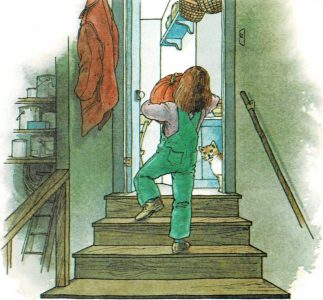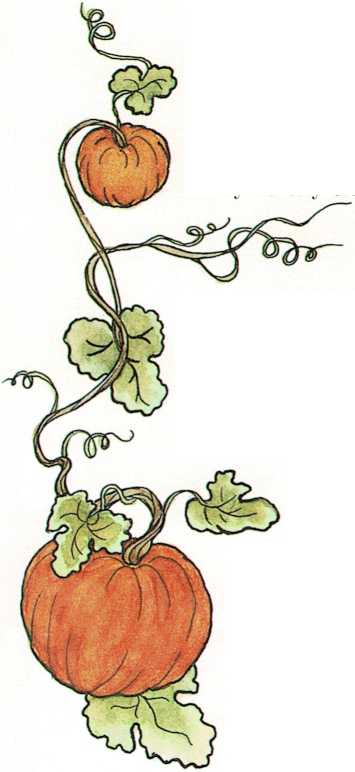
The Night of the Jack-O’-Lantern
from Ramona and Her Father by Beverly Cleary
The Quimby family has a big problem. Mr. Quimby has lost his job, and
everyone is worried and cross. Seven-year-old Ramona does her best to
make people smile, but it isn’t easy. Her older sister Beatrice, who is
always called Beezus, has become a real grouch. Even Picky-picky, the
family cat, stalks around angrily.
i ,t x [j-\’c]{.smallcaps} arc
“Please pass the tommmy-toes,” said Ramona, hoping to make someone in
the family smile. She felt good when her father smiled as he passed her
the bowl of stewed tomatoes. He smiled less and less as the days went by
and he had not found work. Too often he was just plain cross. Ramona had
learned not to rush home from school and ask, “Did you find a job today,
Daddy?” Mrs. Quimby always seemed to look anxious these days, either
over the cost of groceries or money the family owed. Beezus had turned
into a regular old grouch, because she dreaded Creative Writing and
perhaps because she had reached that difficult age Mrs. Quimby was
always talking about, although Ramona found this hard to believe.
Even Picky-picky was not himself. He lashed his tail and stalked angrily
away from his dish when Beezus served him Puss-puddy, the cheapest brand
of cat food Mrs. Quimby could find in the market.
All this worried Ramona. She wanted her father to smile and joke, her
mother to look happy, her sister to be cheerful, and
Picky-picky to eat his food, wash his
whiskers, and purr the way he used to.
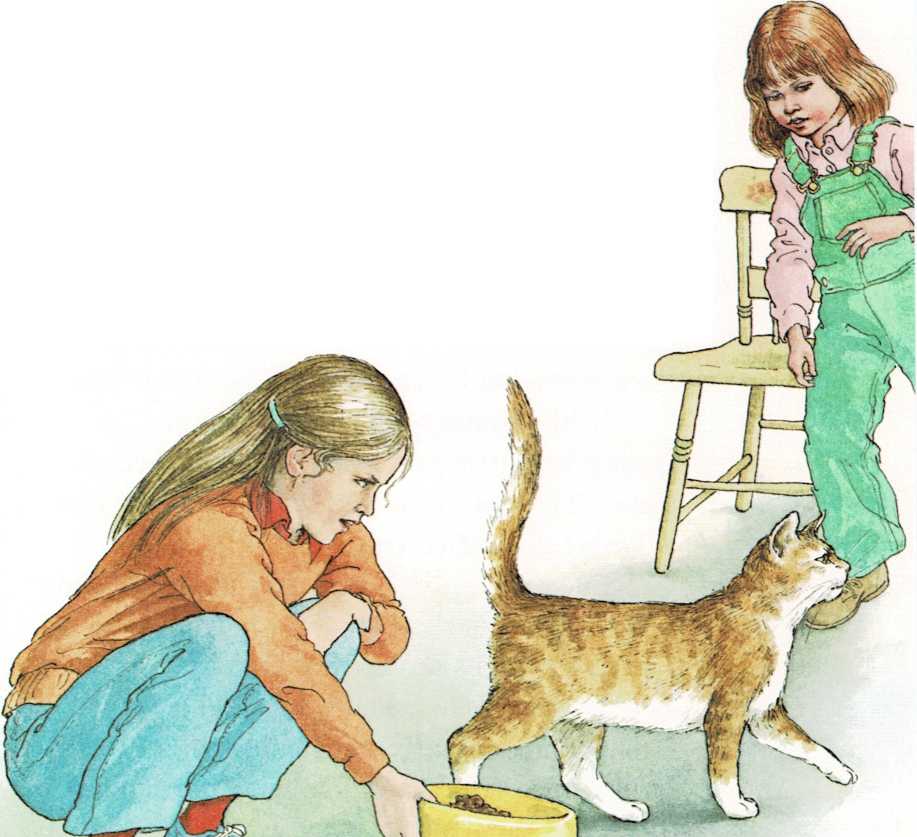
“And so,” Mr. Quimby was saying, “at the end of the interview for the
job, the man said he would let me know if anything turned up.”
Mrs. Quimby sighed. “Let’s hope you hear from him. Oh, by the way, the
car has been making a funny noise. A sort of tappety-tappety sound.”
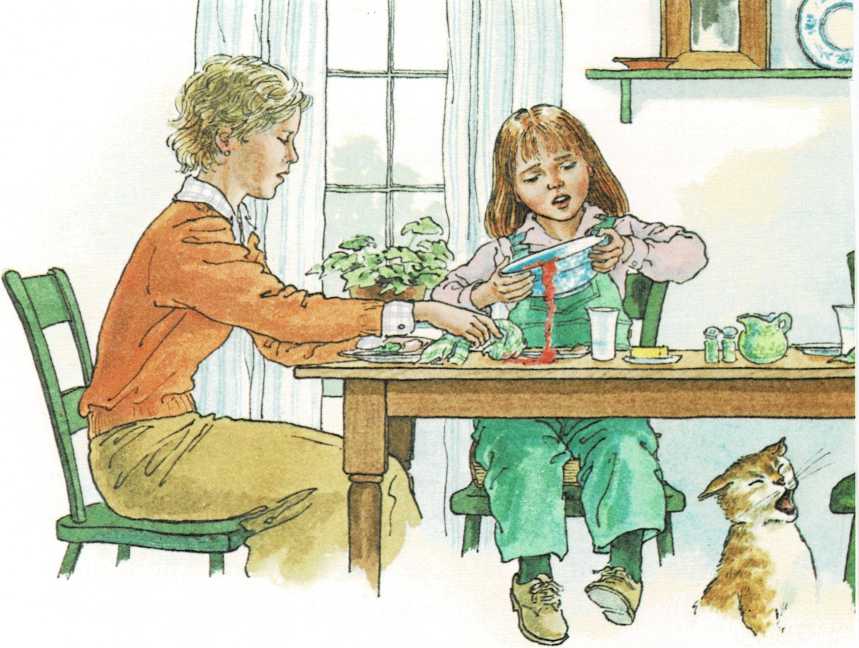
“It’s Murphy’s Law,” said Mr. Quimby. “Anything that can go wrong will.”
Ramona knew her father was not joking this time. Last week, when the
washing machine refused to work, the Quimbys had been horrified by the
size of the repair bill.
“I like tommy-toes,” said Ramona, hoping her little joke would work a
second time. This was not exactly true, but she was willing to sacrifice
truth for a smile.
Since no one paid any attention, Ramona spoke louder as she lifted the
bowl of stewed tomatoes. “Does anybody want any tommy-toes?” she asked.
The bowl tipped. Mrs. Quimby silently reached over and wiped spilled
juice from the table with her napkin.
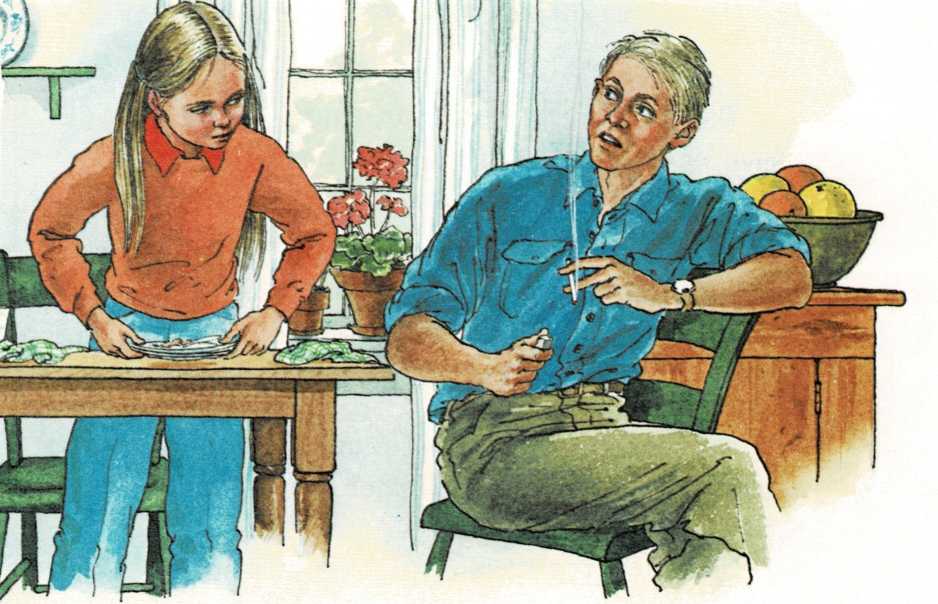
Crestfallen, Ramona set the bowl down. No one had smiled.
“Ramona,” said Mr. Quimby, “my grandmother used to have a saying. ‘First
time is funny, second time is silly, third time is a spanking.’ “
Ramona looked down at her place mat. Nothing seemed to go right lately.
Picky-picky must have felt the same way. He sat down beside Beezus and
meowed his Grossest meow.
Mr. Quimby lit a cigarette and asked his older daughter, “Haven’t you
fed that cat yet?”
Beezus rose to clear the table. “It wouldn’t do any good. He hasn’t
eaten his breakfast. He won’t eat that cheap Puss-puddy.”
“Too bad about him.” Mr. Quimby blew a cloud of smoke toward the
ceiling.
“He goes next door and mews as if we never give him anything to eat,”
said Beezus. “It’s embarrassing.”
“He’ll just have to learn to eat what we can afford,” said Mr. Quimby.
“Or we will get rid of him.”
This statement shocked Ramona. Picky-picky had been a member of the
family since before she was born.
“Well, I don’t blame him,” said Beezus, picking up the cat and pressing
her cheek against his fur. “Puss-puddy stinks.”
Mr. Quimby ground out his cigarette.
“Guess what?” said Mrs. Quimby, as if to change the subject. “Howie’s
grandmother drove out to visit her sister, who lives on a farm, and her
sister sent in a lot of pumpkins for jack-o’-lanterns for the
neighborhood children. Mrs. Kemp gave us a big one, and it’s down in the
basement now, waiting to be carved.”
“Me! Me!” cried Ramona. “Let me get it!”
“Let’s give it a real scary face,” said Beezus, no longer difficult.
“I’ll have to sharpen my knife,” said Mr. Quimby.
“Run along and bring it up, Ramona,” said Mrs. Quimby with a real smile.
Relief flooded through Ramona. Her family had returned to normal. She
snapped on the basement light, thumped down the stairs, and there in the
shadow of the furnace pipes, which reached out like ghostly arms, was a
big, round pumpkin. Ramona grasped its scratchy stem, found the pumpkin
too big to lift that way, bent over, hugged it in both arms, and raised
it from the cement floor. The pumpkin was heavier than she had expected,
and she must not let it drop and smash all over the concrete floor.
“Need some help, Ramona?” Mrs. Quimby called down the stairs.

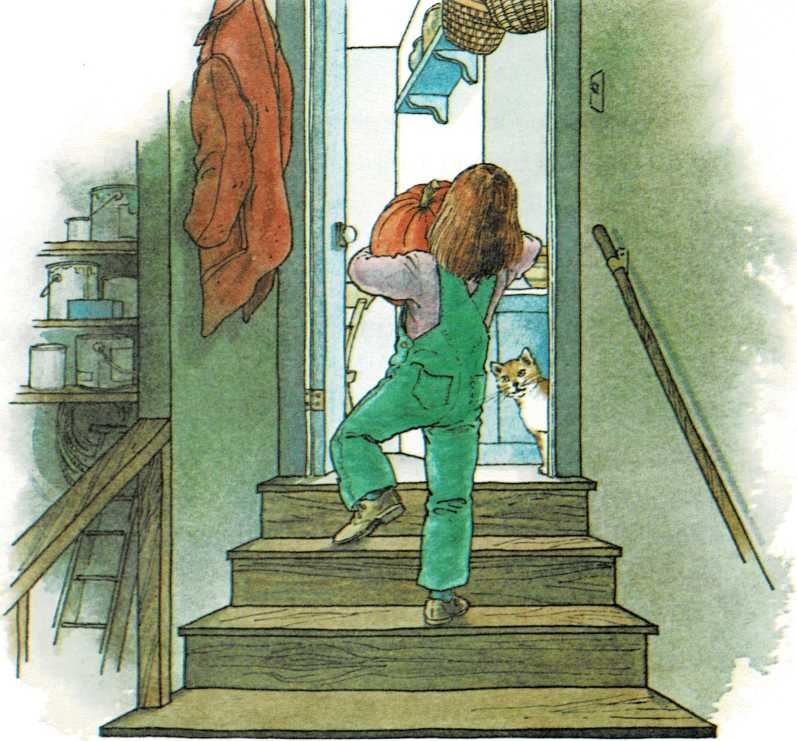
“I can do it.” Ramona felt for each step with her feet and emerged,
victorious, into the kitchen.
“Wow! That is a big one.” Mr. Quimby was sharpening his jackknife on a
whetstone while Beezus and her mother hurried through the dishes.
“A pumpkin that size would cost a lot at the market,” Mrs. Quimby
remarked. “A couple of dollars, at least.”
“Let’s give it eyebrows like last year,” said Ramona.
“And ears,” said Beezus.
“And lots of teeth,” added Ramona.
There would be no jack-o’-lantern with one tooth and three triangles for
eyes and nose in the Quimbys’ front window on Halloween. Mr. Quimby was
the best pumpkin carver on Klickitat Street. Everybody knew that.
\”Hmm. Let’s see now.” Mr. Quimby studied the pumpkin, turning it to
find the best side for the face. “I think the nose should go about
here.” With a pencil he sketched a nose-shaped nose, not a triangle,
while his daughters leaned on their elbows to watch.
“Shall we have it smile or frown?” he asked.
“Smile!” said Ramona, who had had enough of frowning.
“Frown!” said Beezus.
The mouth turned up on one side and down on the other. Eyes were
sketched and eyebrows. “Very expressive,” said Mr. Quimby. “Something
between a leer and a sneer.” He cut a circle around the top of the
pumpkin and lifted it off for a lid.
Without being asked, Ramona found a big spoon for scooping out the
seeds.
Picky-picky came into the kitchen to see if something beside Puss-puddy
had been placed in his dish. When he found that it had not, he paused,
sniffed the unfamiliar pumpkin smell, and with his tail twitching
angrily stalked out of the kitchen. Ramona was glad Beezus did not
notice.
“If we don’t let the candle burn the jack-o’-lantern, we can have
pumpkin pie,” said Mrs. Quimby. “I can even freeze some of the pumpkin
for Thanksgiving.”
Mr. Quimby began to whistle as he carved with skill and care, first a
mouthful of teeth, each one neat and square, then eyes and jagged,
ferocious eyebrows. He was working on two ears shaped like question
marks, when Mrs. Quimby said, “Bedtime, Ramona.”
“I am going to stay up until Daddy finishes,” Ramona informed her
family. “No ifs, ands, or buts.”
“Run along and take your bath,” said Mrs. Quimby, “and you can watch
awhile longer.”
Because her family was happy once more, Ramona did not protest. She
returned quickly, however, still damp under her pajamas, to see what her
father had thought of next. Hair, that’s what he had thought of,
something he could carve because the pumpkin was so big. He cut a few
C-shaped curls around the hole in the top of the pumpkin before he
reached inside and hollowed out a candle holder in the bottom.
“There,” he said and rinsed his jackknife under the kitchen faucet. “A
work of art.”
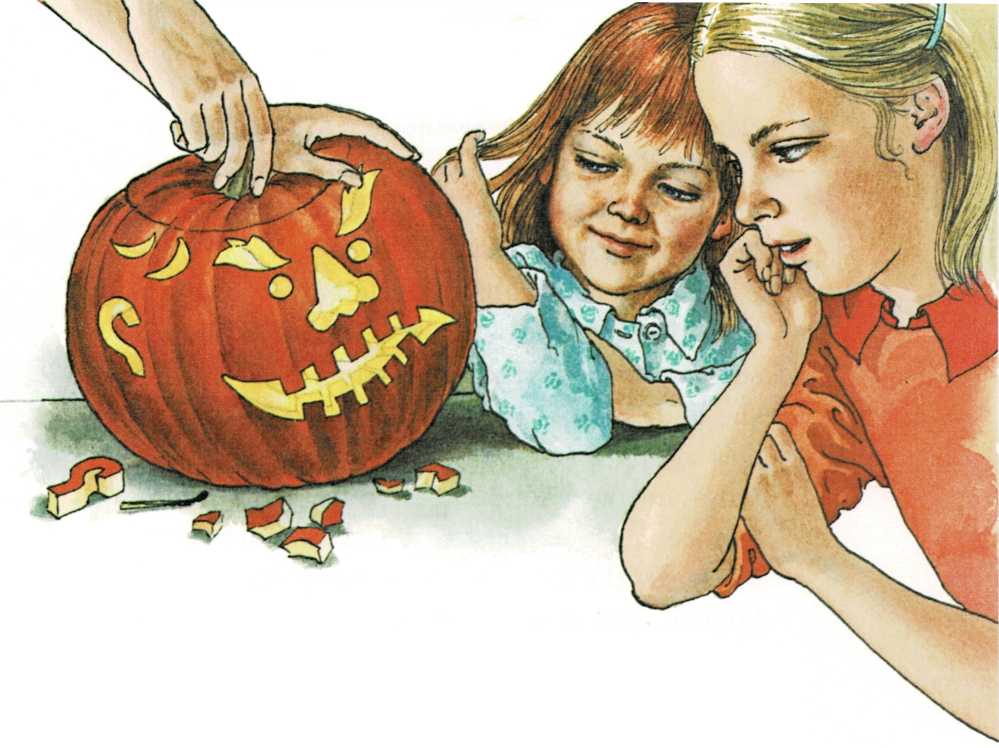
Mrs. Quimby found a candle stub, inserted it in the pumpkin, lit it, and
set the lid in place. Ramona switched off the light. The jack-o’-lantern
leered and sneered with a flickering flame.
“Oh, Daddy!” Ramona threw her arms around her father. “It’s the
wickedest jack-o’-lantern in the whole world.”
Mr. Quimby kissed the top of Ramona’s head. “Thank you. I take that as a
compliment. Now run along to bed.”
Ramona could tell by the sound of her father’s voice that he was
smiling. She ran off to her room without thinking up excuses for staying
up just five more minutes, added a postscript to her prayers thanking
God for
the big pumpkin, and another asking him to find her father a job, and
fell asleep at once, not bothering to tuck her panda bear in beside her
for comfort.
In the middle of the night Ramona found herself suddenly awake without
knowing why she was awake. Had she heard a noise? Yes, she had. Tense,
she listened hard. There it was again, a sort of thumping, scuffling
noise, not very loud but there just the same. Silence. Then she heard it
again. Inside the house. In the kitchen. Something was in the kitchen,
and it was moving.
Ramona’s mouth was so dry she could barely whisper, “Daddy!” No answer.
More thumping. Someone bumped against the wall. Someone, something was
coming to get them. Ramona thought about the leering, sneering face on
the kitchen table. All the ghost stories she had ever heard, all the
ghostly pictures she had ever seen flew through her mind. Could the
jack-o’-lantern have come to life? Of course not. It was only a pumpkin,
but still— A bodyless, leering head was too horrifying to think about.
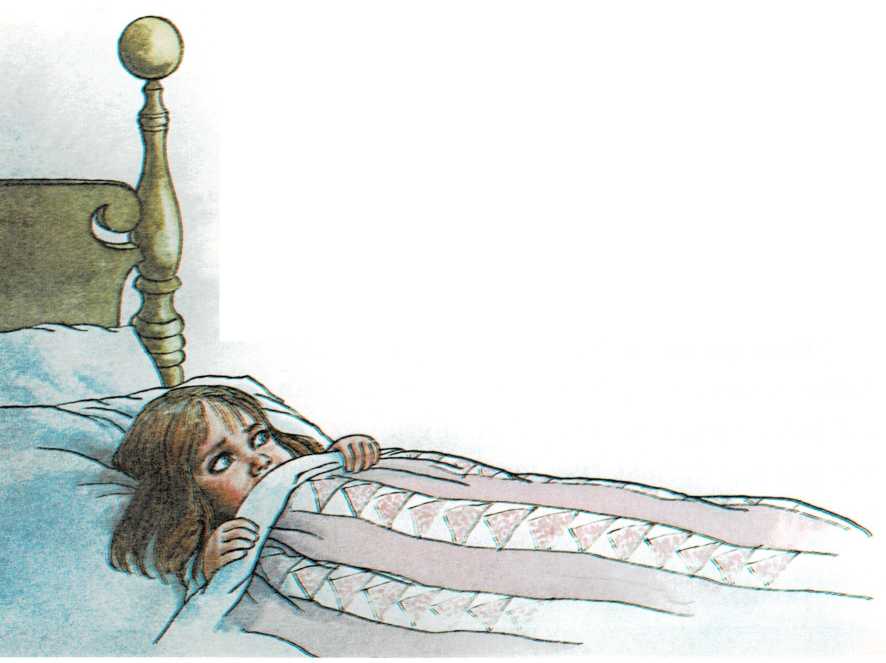
Ramona sat up in bed and shrieked, “Daddy!”
A light came on in her parents’ room, feet thumped to the floor,
Ramona’s tousled father in rumpled pajamas was silhouetted in Ramona’s
doorway, followed by her mother tugging a robe on over her short
nightgown.
“What is it, Baby?” asked Mr. Quimby. Both Ramona’s parents called her
Baby when they were worried about her, and tonight Ramona was so
relieved to see them she did not mind.
“Was it a bad dream?” asked Mrs. Quimby.
“Th-there’s something in the kitchen.” Ramona’s voice quavered.
Beezus, only half-awake, joined the family. “What’s happening?” she
asked. “What’s going on?”
“There’s something in the kitchen,” said Ramona, feeling braver.
“Something moving.”
“Sh-h!” commanded Mr. Quimby.
Tense, the family listened to silence.
“You just had a bad dream.” Mrs. Quimby came into the room, kissed
Ramona, and started to tuck her in.
Ramona pushed the blanket away. “It was not st bad dream,” she
insisted. “I did too hear something. Something spooky.”
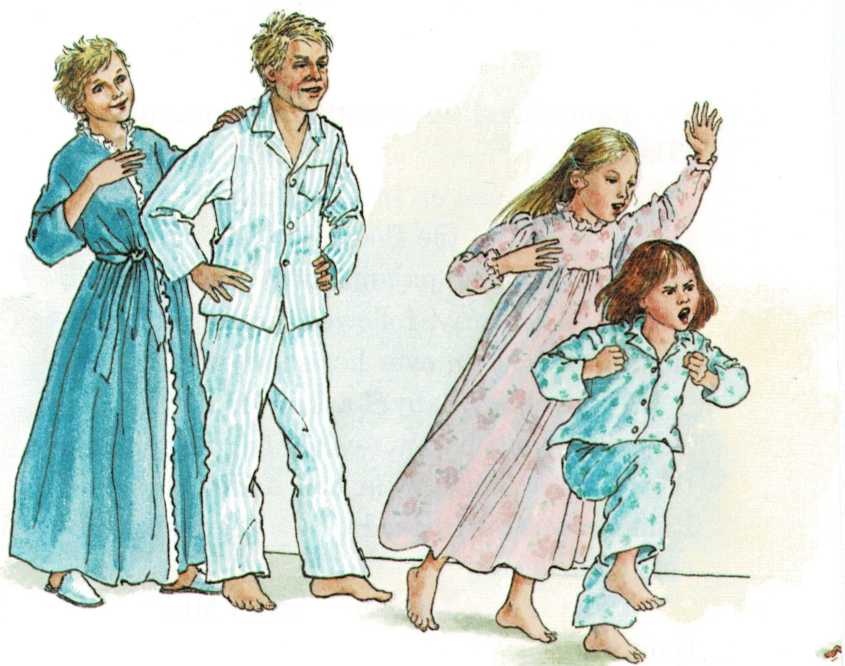
“All we have to do is look,” said Mr. Quimby, reasonable—and bravely,
Ramona thought. Nobody would get her into that kitchen.
Ramona waited, scarcely breathing, fearing for her father’s safety as he
walked down the hall and flipped on the kitchen light. No shout, no yell
came from that part of the house. Instead her father laughed, and Ramona
felt brave enough to follow the rest of the family to see what was
funny.
There was a strong smell of cat food in the kitchen. What Ramona saw,
and what Beezus saw, did not strike them as one bit
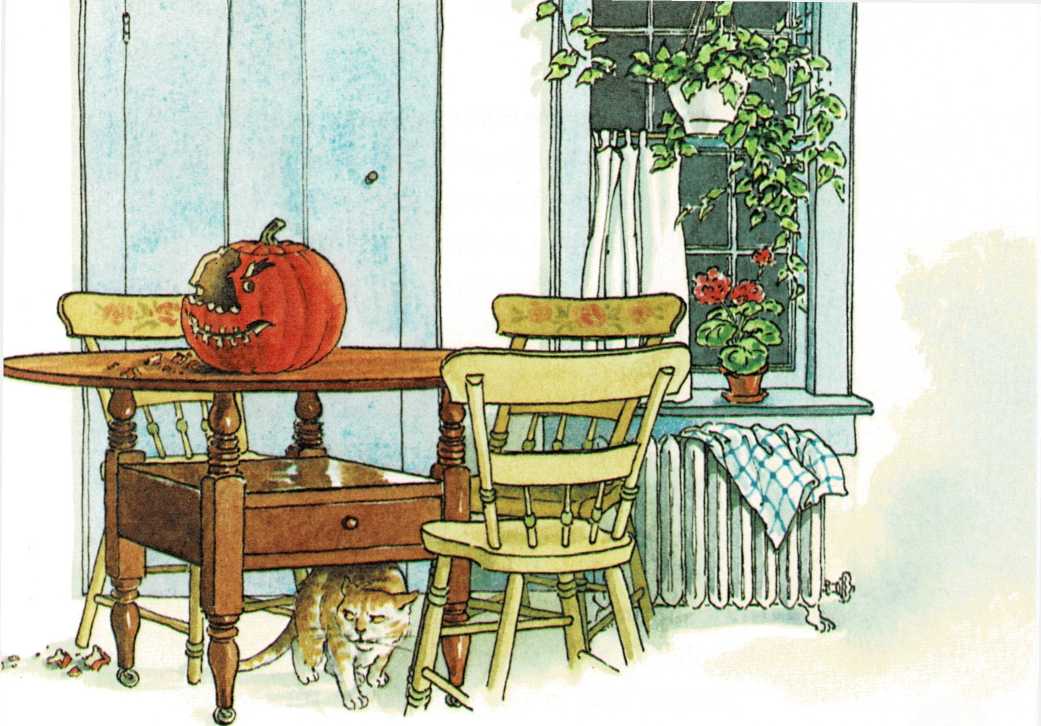
funny. Their jack-o’-lantern, the jack-o’-lantern their father had
worked so hard to carve, no longer had a whole face. Part of its
forehead, one ferocious eyebrow, one eye, and part of its nose were
gone, replaced by a jagged hole edged by little teeth marks. Picky-picky
was crouched in guilt under the kitchen table.
The nerve of that cat. “Bad cat! Bad cat!” shrieked Ramona, stamping her
bare foot on the cold linoleum. The old yellow cat fled to the dining
room, where he crouched under the table, his eyes glittering out of the
darkness.
Mrs. Quimby laughed a small rueful laugh. “I knew he liked canteloupe,
but I had no idea he liked pumpkin, too.” With a butcher’s knife she
began to cut up the remains of the jack-o’-lantern, carefully removing,
Ramona noticed, the parts with teeth marks.
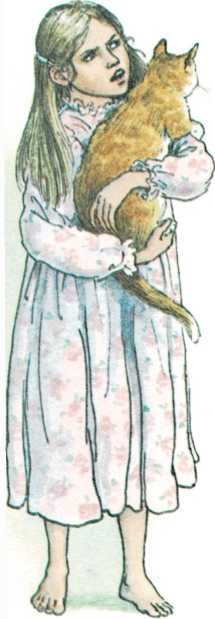
“I told you he wouldn’t eat that awful Puss-puddy.” Beezus was
accusing her father of denying their cat. “Of course he had to eat our
jack-o’-lantern. He’s starving.”
“Beezus, dear,” said Mrs. Quimby. “We simply cannot afford the brand of
food Picky-picky used to eat. Now be reasonable.”
Beezus was in no mood to be reasonable. “Then how come Daddy can afford
to smoke?” she demanded to know.
Ramona was astonished to hear her sister speak this way to her mother.
Mr. Quimby looked angry. “Young lady,” he said, and when he called
Beezus young lady, Ramona knew her sister had better watch out. “Young
lady, I’ve heard enough about that old tom cat and his food. My
cigarettes are none of your business.”
Ramona expected Beezus to say she was sorry or maybe burst into tears
and run to her room. Instead she pulled Picky-picky out from under the
table and held him to her chest as if she were shielding him from
danger. “They are too my business,” she informed her father. “Cigarettes
can kill you. Your lungs will turn black and you’ll die! We made
posters about it at school. And besides, cigarettes pollute the air!”
Ramona was horrified by her sister’s daring, and at the same time she
was a tiny bit pleased. Beezus was usually well-behaved while Ramona was
the one who had tantrums. Then she was struck by the meaning of her
sister’s angry words and was frightened.
“That’s enough out of you,” Mr. Quimby told Beezus, “and let me remind
you that if you had shut that cat in the basement as you were supposed
to, this would never have happened.”
Mrs. Quimby quietly stowed the remains of the jack-o’-lantern in a
plastic bag in the refrigerator.
Beezus opened the basement door and gently set Picky-picky on the top
step. “Night-night,” she said tenderly.
“Young lady,” began Mr. Quimby. Young lady again! Now Beezus was really
going to catch it. “You are getting altogether too big for your britches
lately. Just be careful how you talk around this house.”
Still Beezus did not say she was sorry. She did not burst into tears.
She simply stalked off to her room.

Ramona was the one who burst into tears. She didn’t mind when she and
Beezus quarreled. She even enjoyed a good fight now and then to clear
the air, but she could not bear it when anyone else in the family
quarreled, and those awful things Beezus said—were they true?
“Don’t cry, Ramona.” Mrs. Quimby put her arm around her younger
daughter. “We’ll get another pumpkin.”
“B-but it won’t be as big,” sobbed Ramona, who wasn’t crying about the
pumpkin at all. She was crying about important things like her father
being cross so much now that he wasn’t working and his lungs turning
black and Beezus being so disagreeable when before she had always been
so polite (to grown-ups) and anxious to do the right thing.
“Come on, let’s all go to bed and things will look brighter in the
morning,” said Mrs. Quimby.
“In a few minutes.” Mr. Quimby picked up a package of cigarettes he had
left on the kitchen table, shook one out, lit it, and sat down, still
looking angry.
Were his lungs turning black this very minute? Ramona wondered. How
would anybody know, when his lungs were inside him? She let her mother
guide her to her room and tuck her in bed.
“Now don’t worry about your jack-o’-lantern. We’ll get another pumpkin.
It won’t be as big, but you’ll have your jack-o’-lantern.” Mrs. Quimby
kissed Ramona good-night.
“Nighty-night,” said Ramona in a muffled voice. As soon as her mother
left, she hopped out of bed and pulled her old panda bear out from under
the bed and tucked it under the covers beside her for comfort. The bear
must have been dusty because Ramona sneezed.
“Gesundheit!” said Mr. Quimby, passing by her door. “We’ll carve
another jack-o’-lantern tomorrow. Don’t worry.” He was not angry with
Ramona.
Ramona snuggled down with her dusty bear. Didn’t grown-ups think
children worried about anything but jack-o’-lanterns? Didn’t they know
children worried about grown-ups?
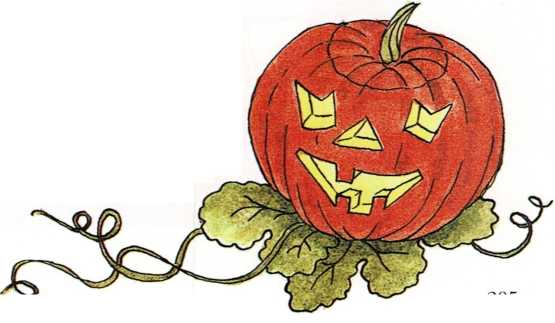
Ramona and Beezus think up a great plan to get their father to quit
smoking—as you will discover when you read the rest of Ramona and Her
Father. And if you liked this story, you will want to read others of
the more than twenty books Beverly Cleary has written, such as Ramona
the Brave, Henry and Ribsy, and Henry and Beezus.

